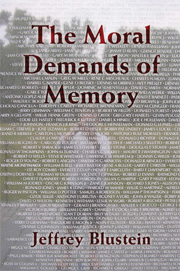6 - Memory and Bearing Witness
Published online by Cambridge University Press: 05 June 2012
Summary
Those who are alive receive a mandate from those who are silent forever. They can fulfill their duties only by trying to reconstruct precisely things as they were, and by wresting the past from fictions and legends.
– Czeslaw MiloszWITNESSING IN THE CONTEMPORARY WORLD
The previous chapters have explored a number of conceptual and normative issues related to individual and collective memory, including: the nature of and differences between these two types of memory; the reciprocal relationship between individual and collective memory, on the one hand, and individual and collective identity, on the other; the virtues associated with taking responsibility for one's personal past; the role of collective memory in repairing historical injustice; the relationship between history and collective memory; and the ethical and moral obligations of remembrance, collective remembrance as well as personal remembrance of the dear departed. Although collective memory is not reducible to the aggregate of individual memories, I have claimed that collective memory and individual memory do not exist in completely separate domains. On the contrary, each inevitably contributes to and is intertwined with the other. The collective memory of a group is incorporated, explicitly or implicitly, into the individual memories of its members, at the same time that they put the stamp of their personal memories on the memories they share. There are also analogies with respect to some of these issues between individual and collective memory, as was clear from my discussion of taking responsibility for one's personal past in Chapter 2 and collectively doing justice to the past in Chapter 3.
- Type
- Chapter
- Information
- The Moral Demands of Memory , pp. 301 - 364Publisher: Cambridge University PressPrint publication year: 2008

